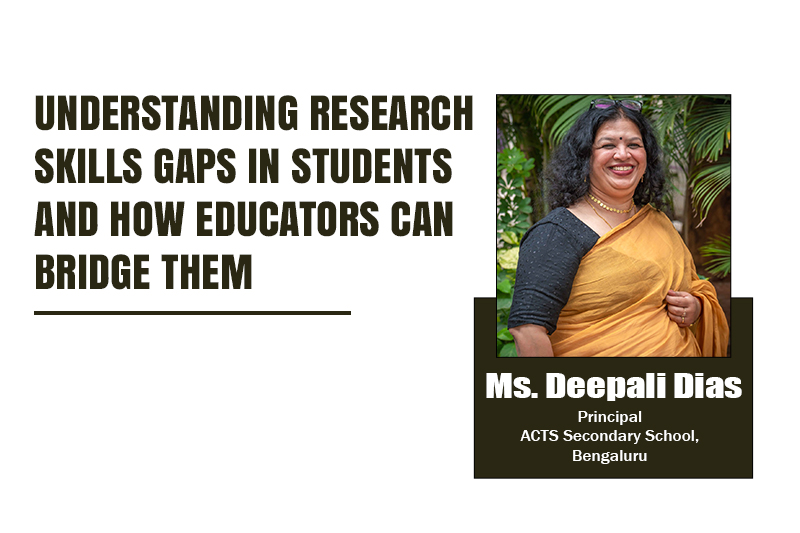Ms. Una Roy Chowdhury, DPS Rewari, Advocates Mental Health & Emotional Wellness in Education
“The highest education is that which does not merely give us information, but makes our life in harmony with all existence.” – Rabindranath Tagore
In a world driven by relentless pursuit of success, innovation, and achievement, a quiet crisis is unfolding—one that is often overlooked but deeply consequential. Mental health awareness in education, particularly among the younger generation, is deteriorating even as society progresses in other areas. Ms. Una Roy Chowdhury, DPS Rewari Principal, believes this is a challenge for families and individuals and the entire education system. An experienced academician and certified Executive and Happiness Coach, she has long advocated for nurturing the intellectual and emotional lives of students and educators alike.
In her view, the accurate measure of a nation’s strength lies not in its economic output or technological advancements, but in the youth emotional resilience and inner health of its people, especially its youth. And this begins in the classroom.
A Growing Concern: The Emotional Health of the Young
According to the World Health Organization, one in eight people globally lives with a mental health disorder. Among these, children and adolescents represent an increasingly vulnerable population segment. Schools, once considered sanctuaries of learning and personal growth, are now witnessing growing instances of stress in students, anxiety, social withdrawal, and emotional burnout.
Ms. Chowdhury observes that what was once considered an occasional challenge has often become chronic. “We are seeing students who are academically competent but emotionally fragile,” she notes. “This is a sign that something fundamental is missing in our approach to holistic education in India.”
The traditional model of schooling, heavily focused on performance and results, is no longer sufficient. She believes the time has come for schools to evolve into holistic institutions—places where emotional wellness in education and mental well-being are as important as academic success.
Emotional Literacy as a Core Curriculum
To address this pressing issue, Ms. Chowdhury advocates for integrating emotional literacy in schools into the mainstream education system. Emotional literacy—the ability to understand, express, and manage emotions—must be taught and nurtured from an early age.
She emphasizes the importance of consciously incorporating self-awareness, empathy, and social-emotional learning in India into the daily fabric of school life. These are not ‘soft skills’ or extracurricular add-ons, but foundational life skills that shape a child’s ability to cope, adapt, and thrive.
Teachers, too, play a pivotal role in this transformation. Beyond their role as subject matter experts, they must be equipped to identify early signs of distress in students. Supporting teachers in schools through professional development programs should include training in mental health curriculum and first-line emotional support strategies. “A teacher who can notice the unspoken pain in a child’s silence is worth more than a dozen textbooks,” Ms. Chowdhury reflects.
Institutional Culture and Mental Health Infrastructure
While curriculum changes are essential, they must be matched by systemic support. Just as schools invest in state-of-the-art labs, libraries, and sports facilities, they must also invest in school counsellor importance and mental health infrastructure. In-house counsellors should not be a luxury or an afterthought but a standard feature in every school.
At Delhi Public School Rewari, Ms. Chowdhury has championed the creation of safe emotional spaces in schools where students and staff can speak freely, seek guidance, and feel heard. Open-door policies, regular mental health sessions, and peer mentoring programs are actively encouraged.
She also calls for redefining school leadership. “Empathy must be the cornerstone of modern educational leadership,” she insists. “Transactional leadership is no longer sustainable in emotionally demanding environments like schools.” Leadership, she believes, must not only be visionary but also compassionate.
The Educator’s Burden—and Support
While much is said about student stress, the emotional toll on educators is often neglected. Teaching is a profession of immense emotional labor. Yet, teachers are frequently expected to navigate their challenges silently while supporting others.
Ms. Chowdhury strongly advocates for introducing teacher mental health support, mental health leaves, regular wellness check-ins, and safe avenues for staff to express and process their emotions. Institutions must create a culture where it is acceptable for educators to prioritise their mental health without stigma or judgment.
“Happy teachers make for healthy classrooms,” she states simply. “A burnt-out teacher cannot ignite the flame of learning in others.”
Breaking the Stigma: A Collective Responsibility
Stigma remains one of the most significant barriers to addressing mental health effectively. In many parts of India, seeking psychological help is still viewed with suspicion or shame. Ms. Chowdhury believes that this narrative must change—urgently and collectively.
“We must normalise the idea that seeking help is a sign of strength, not weakness,” she says. “The more openly we talk about it, the more we create a culture of acceptance.”
Digital platforms can be powerful allies in this regard. Tele-counselling, awareness campaigns, and online mental health education can play significant roles in reaching underserved and rural populations. Awareness must transcend geography.
Every Individual Can Make a Difference
Beyond institutions and policy, Ms. Chowdhury strongly believes in the power of individual kindness. A warm smile, a listening ear, or a word of encouragement may seem small, but they can be profoundly healing in moments of distress.
“We may not all be trained therapists, but we can all be kind,” she says. “Each of us holds the power to make someone feel seen, heard, and valued.”
A Vision for the Future
At Delhi Public School Rewari, Ms. Chowdhury’s leadership has instilled a culture where nurturing the mind is as integral as shaping the intellect. The school does not view student well-being in India as separate from academic rigor—it sees them as deeply interdependent. A stable, supported mind, she believes, is not merely a personal asset but a national one. It is the quiet but essential foundation of a just, compassionate, and thriving society.
As the world moves forward, she urges all stakeholders—educators, parents, policymakers, and students—to act not in response to crisis, but in anticipation of a better, more holistic future.
“Let us not wait for breaking points,” Ms. Chowdhury concludes. “Let us prioritize mental well-being daily—in our classrooms, workplaces, homes, and hearts.”
Want more thought-provoking articles like this? Check out EducationToday – where education meets innovation.






